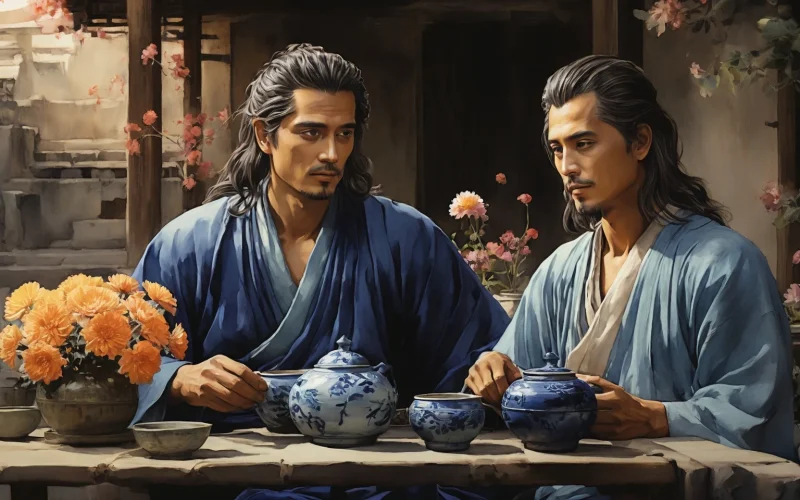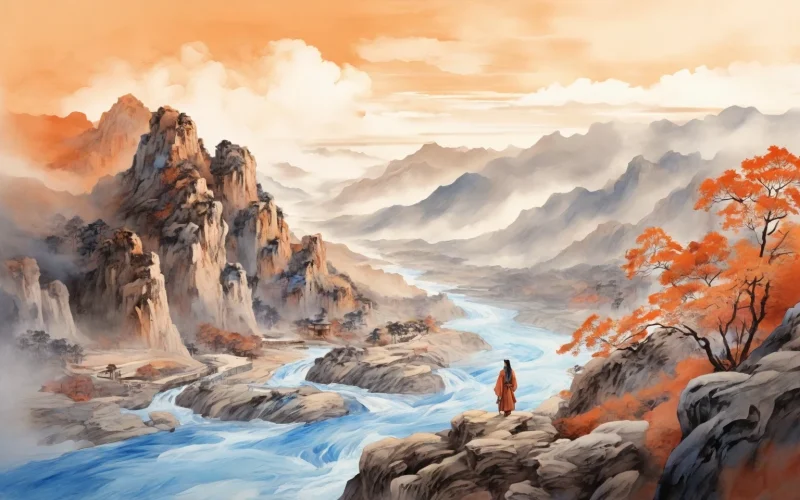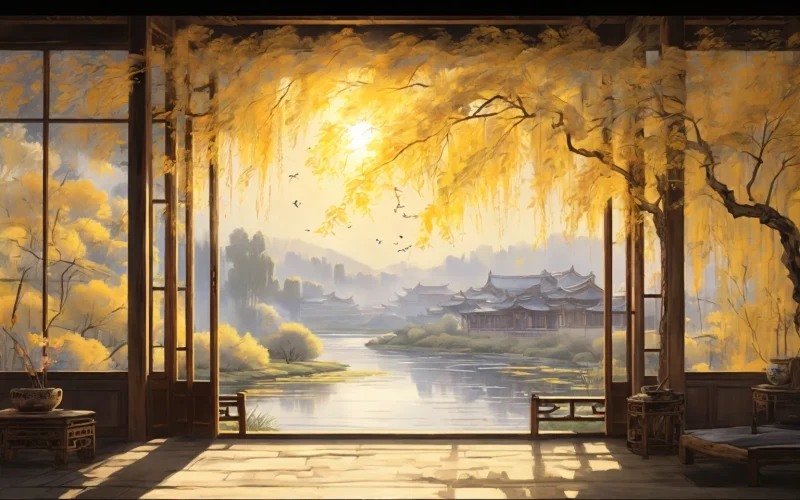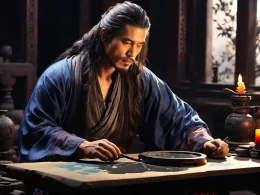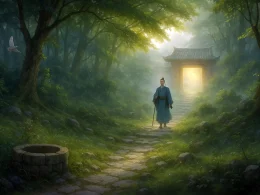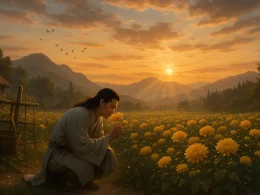While young, I was not worded about livelihood.
Old now, how could I grudge money for buying wine?
Let's spend ten thousand coins for a jarful of drink good!
Looking in face, two years more we'll be sixty-nine.
We read and play the drinkers' wager game at leisure;
Drunk, we listen to verse better than music light.
When chrysanthemums yellow, may 1 have the pleasure
To invite you to drink my home-brew with delight?
Original Poem:
「与梦得沽酒闲饮且约后期」
白居易
少时犹不忧生计,老去谁能惜酒钱?
共把十千沽一斗,相看七十欠三年。
闲征雅令穷经史,醉听清吟胜管弦。
更待菊黄家酿熟,共君一醉一陶然。
Interpretation:
In the second year of Emperor Wenzong’s Kaicheng era (837), Bai Juyi and Liu Yuxi both held official positions in Luoyang. However, their roles were insignificant, and they faced political neglect. Nearing seventy, with no further hopes for their careers, they found solace in poetry and wine. This poem was written during one of their drinking gatherings, expressing both the joy of revelry and the underlying sorrow of their frustrated ambitions.
First Couple: “少时犹不忧生计,老去谁能惜酒钱。”
(In youth, I never worried about my livelihood; now in old age, why should I begrudge the price of wine?)
The poet reminisces about his carefree youth and asserts that even in old age, he refuses to be troubled by mundane concerns. This line conveys an air of unrestrained openness. However, beneath this apparent ease lies a deeper sentiment—an unspoken lament over the passage of time and the ups and downs of life, imbuing the verse with a quiet melancholy.
Second Couple: “共把十千沽一斗,相看七十欠三年。”
(Together, we spend ten thousand coins to buy a measure of wine; gazing at each other, we are three years shy of seventy.)
This couplet carries a touch of humor while lamenting the merciless passage of time. The two friends generously contribute to their drinking, demonstrating their camaraderie. The phrase "gazing at each other" captures a moment of mutual reflection—each sees in the other the signs of aging, reminding them of their own mortality. Having been born in the same year, their shared experience deepens their unspoken sorrow, making this an especially poignant scene.
Third Couple: “闲征雅令穷经史,醉听清吟胜管弦。”
(In leisure, we challenge each other with scholarly games; in drunkenness, we savor refined poetry, surpassing the melodies of flutes and strings.)
Here, the poet describes their elegant pastimes during their drinking sessions. Instead of mere indulgence, they engage in literary contests and appreciate poetry more than music. This reveals their refined tastes and intellectual companionship. However, beneath this cultivated leisure lurks a sense of resignation—they are not truly carefree, but rather using poetry and wine to momentarily forget their disappointments.
Fourth Couple: “更待菊黄家酿熟,共君一醉一陶然。”
(When chrysanthemums bloom and the home-brewed wine is ready, we shall drink again in joyful abandon.)
Looking beyond the present, the poet extends their drinking pleasure into the future. The mention of "chrysanthemums turning yellow" alludes to the upcoming Double Ninth Festival, symbolizing a promise to reunite. While the final lines exude a tone of carefree indulgence, they also carry an undercurrent of reflection on life’s impermanence—perhaps only through intoxication can they momentarily escape the burdens of the world.
Writing Characteristics:
The poem employs a direct yet deeply expressive language, blending lighthearted revelry with subtle sorrow. The first couplet sets the tone with a contrast between youth and old age, highlighting the poet’s changing perspective. The second couplet uses humorous exaggeration to deepen the sense of shared friendship and inevitable aging. The third couplet presents a refined and intellectual form of leisure, emphasizing their mutual understanding. The final couplet extends the emotional depth, leaving a lingering sense of nostalgia. While appearing to celebrate a casual drinking gathering, the poem ultimately conveys the poet’s regrets over time’s passage and the harsh realities of political setbacks, creating a powerful and enduring impact.
Overall Appreciation:
On the surface, the poem depicts a joyful drinking session among friends, but beneath this revelry lies a profound reflection on life’s uncertainties. Bai Juyi uses wine as both a medium for joy and a veil for sorrow. The contrast between their youthful indifference to money and their present indulgence suggests both defiance and resignation. The most poignant line—"gazing at each other, three years shy of seventy"—captures the bittersweet realization of aging and the transience of time. Despite the pleasure of poetry and scholarly games, the underlying loneliness remains, and only the promise of future reunions offers a fleeting solace. This poem, while lighthearted in tone, unfolds in layers, transitioning from humor to introspection, leaving the reader with a deep sense of wistfulness.
Insights:
This poem reminds us that life, like wine, is a mixture of bitterness and sweetness. As time moves inexorably forward, true companionship becomes the most valuable solace. Bai Juyi and Liu Yuxi’s friendship was more than a mere poetic exchange—it was a refuge for two kindred spirits navigating the storms of life. Their ability to transform sorrow into refined leisure and poetic elegance teaches us that while we cannot control fate, we can choose to embrace it with an open heart. Through poetry and wine, they capture the essence of friendship—not in moments of triumph, but in standing together through the trials of time.
Poem translator:
Xu Yuan-chong (许渊冲)
About the poet:

Bai Juyi (白居易), 772-846 AD, was originally from Taiyuan, then moved to Weinan in Shaanxi. Bai Juyi was the most prolific poet of the Tang Dynasty, with poems in the categories of satirical oracles, idleness, sentimentality, and miscellaneous rhythms, and the most influential poet after Li Bai Du Fu.





